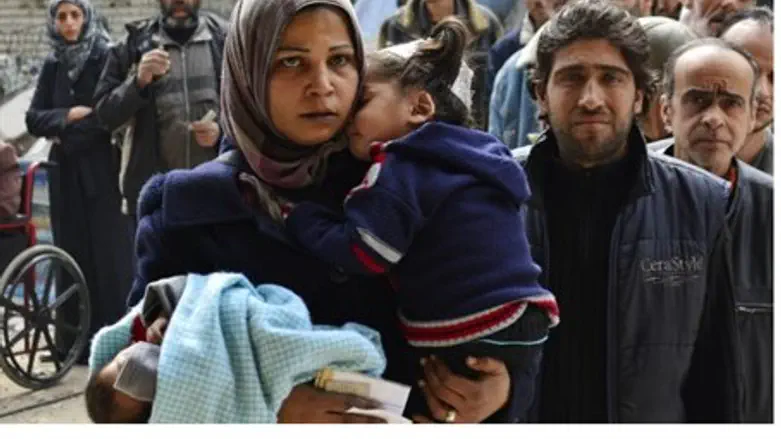
The UN Security Council on Monday demanded that aid workers be allowed to distribute food and other supplies to residents trapped by fighting inside the Damascus neighborhood of Yarmouk, which has been stormed by the Islamic State (ISIS), AFP reported.
The 15-member council also demanded that fighters from ISIS and the Al-Qaeda-linked Al-Nusra Front withdraw from the neighborhood, and that bombing raids be halted.
Fighting has intensified since April 1 when ISIS fighters seized part of the neighborhood, clashing with other armed groups as Syrian government forces besieged the area.
The neighborhood, which is referred to as a “Palestinian refugee camp”, had been besieged by government forces since 2013 and is estimated to be home to 18,000 people.
The council on Monday met for the second time in two weeks to discuss the Yarmouk crisis after Secretary General Ban Ki-moon said action must be taken to prevent a "massacre" at the camp.
In a unanimous statement, the council "called for unhindered humanitarian access to the Yarmouk camp and for the protection of civilians inside the camp."
The council heard a report from Pierre Krahenbuhl, head of the Palestinian UNRWA relief agency, who returned from a recent visit to the area to try to secure access to Yarmouk.
The UN official later told reporters that the situation in Yarmouk "remains very extreme in both circumstances and hardship" but he declined to comment on military operations by the various armed groups.
Palestinian officials said last week that ISIS fighters had retreated from the neighborhood.
Krahenbuhl noted that a $30 million appeal for funding for the Yarmouk aid effort had received few pledges. He proposed that a delegation from the Security Council travel to Yarmouk for a first-hand view of the situation.
The Yarmouk "refugee camp" is in fact a sprawling neighborhood at the southern edge of Damascus. Most of the Palestinians who live there are descendants of Arab refugees from Israel's War of Independence, though few are themselves refugees. Uniquely, the UN founded UNRWA as a separate agency to its official refugee agency UNHCR in order to perpetuate "Palestinian refugee" status to all descendants of actual Palestinian Arab refugees.
No other group of refugees - including Jewish refugees from Arab states or from the Arab armies which occupied Judea, Samaria and Gaza in 1948 and expelled Jewish residents - are granted such hereditary refugee status.
There are thousands of people registered as Palestinian refugees in Israel’s neighboring countries, including Lebanon and Syria. Palestinian refugees in Lebanon have limited work options and are refused citizenship.
